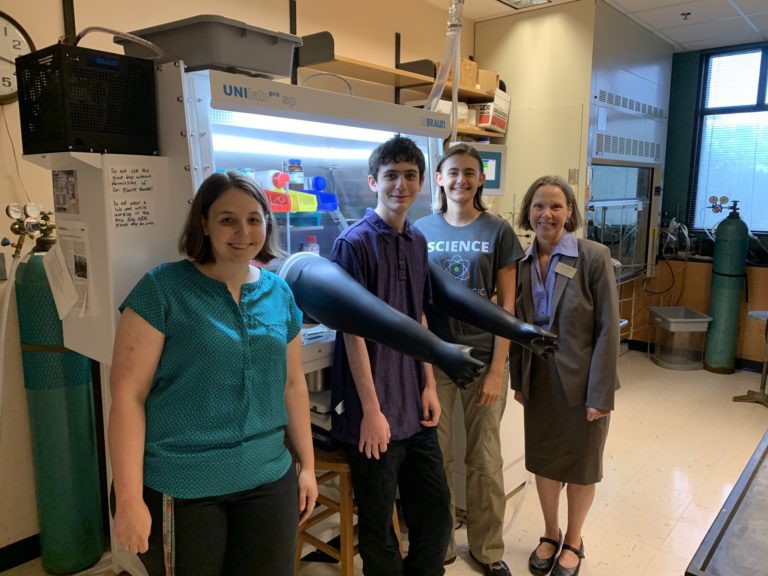
Student-faculty colLABorations just got a boost at New College—with a competitive chemistry research grant arriving just in time for the fall semester kickoff.
Starting September 1—thanks to the advocacy and proposal-writing skills of Assistant Professor of Chemistry Rebecca Black, Ph.D.—the Undergraduate New Investigator (UNI) Grant from the Petroleum Research Fund (maintained by the American Chemical Society (ACS)) will be supporting years worth of New College STEM research.
It was not an easy feat for Black to secure the $55,000 grant, she said, as only about 20 percent of the proposals submitted to the program are typically backed. The funds are designated for “scientists and engineers who are beginning their independent careers in academia, and have limited or no preliminary results for a research project they wish to pursue”—an ideal fit for Black, who established her laboratory at New College in 2018.
“I’m very grateful and excited that my research proposal was funded,” Black said. “I’m hoping that this grant’s seed money to generate ‘proof-of-concept’ data on this project will make it more likely to receive continued research support in the future.”
So how, exactly, will the funding benefit Black and her students?
“Over two years, the grant will support me in pursuing full-time research during Summer 2022 and Summer 2023. More importantly, 40 percent of the grant funds must be used to support undergraduate students,” Black said. “This means that I’ll be able to hire students as paid research assistants during those summers as well as during the next two academic years.”
A portion of the budget is also set aside for conference travel, which will offset costs for Black and her students to present their research at regional and national ACS meetings. But the lab and classroom work has already begun at New College.
“I already have four students working on the project this fall: two in a tutorial, one for thesis research and one paid research assistant,” Black said. “I encourage students with at least one semester of Organic Chemistry Lecture & Lab, who are interested in working on this project, to reach out to me to learn more. Independent Study Period (ISP) is a particularly good time to join the lab to learn skills needed to do this research, especially if students are interested in continuing to work over the summer.”
The suggested research that Black outlined in her UNI Grant proposal is a bit esoteric—relating to organometallic chemistry and catalyst design. New College researchers, she said, will help expand “the set of known synthetic routes to BIPHEP derivatives (types of diphosphine molecules) and provide electronic tuning requirements for a new series of catalysts for alcohol acceptorless dehydrogenation (a much ‘greener’ way to oxidize alcohols than other routes).”
What does that mean in simple terms? Well, the chemistry is not easy to explain (although Black is happy to speak with students who want to learn more), but the impact the grant will have on New College is.
“The research will have significant, positive impacts on the undergraduate researchers who will plan and execute the majority of the experiments,” Black said. “Students will apply what they have learned in their undergraduate chemistry courses in a practical and hands-on way, and have the opportunity to develop advanced synthesis and characterization skills that are typically beyond the scope of most undergraduate courses (i.e. manipulating air- and moisture-sensitive compounds).”
These additional skills will give students a competitive edge when applying to positions in graduate programs, government research facilities and STEM industries.
“Also, participating in catalyst design and evaluation (especially with the goal of improving an environmentally-benign organic transformation) may cause students to more carefully consider the environmental impact of reactions and their future syntheses—and to seek alternative, green methods,” Black said. “This grant will help New College students make tangible contributions to the scientific community, grow as environmentally-responsible chemical problem solvers, and pursue careers in the chemical sciences.”
Interested in participating in Black’s chemistry research? Reach out to her at 941-487-4368 or [email protected].
To learn more about the chemistry program at New College, visit ncf.edu/academics/undergraduate-program/division-of-natural-sciences/chemistry.
Abby Weingarten is the senior editor in the Office of Communications & Marketing.